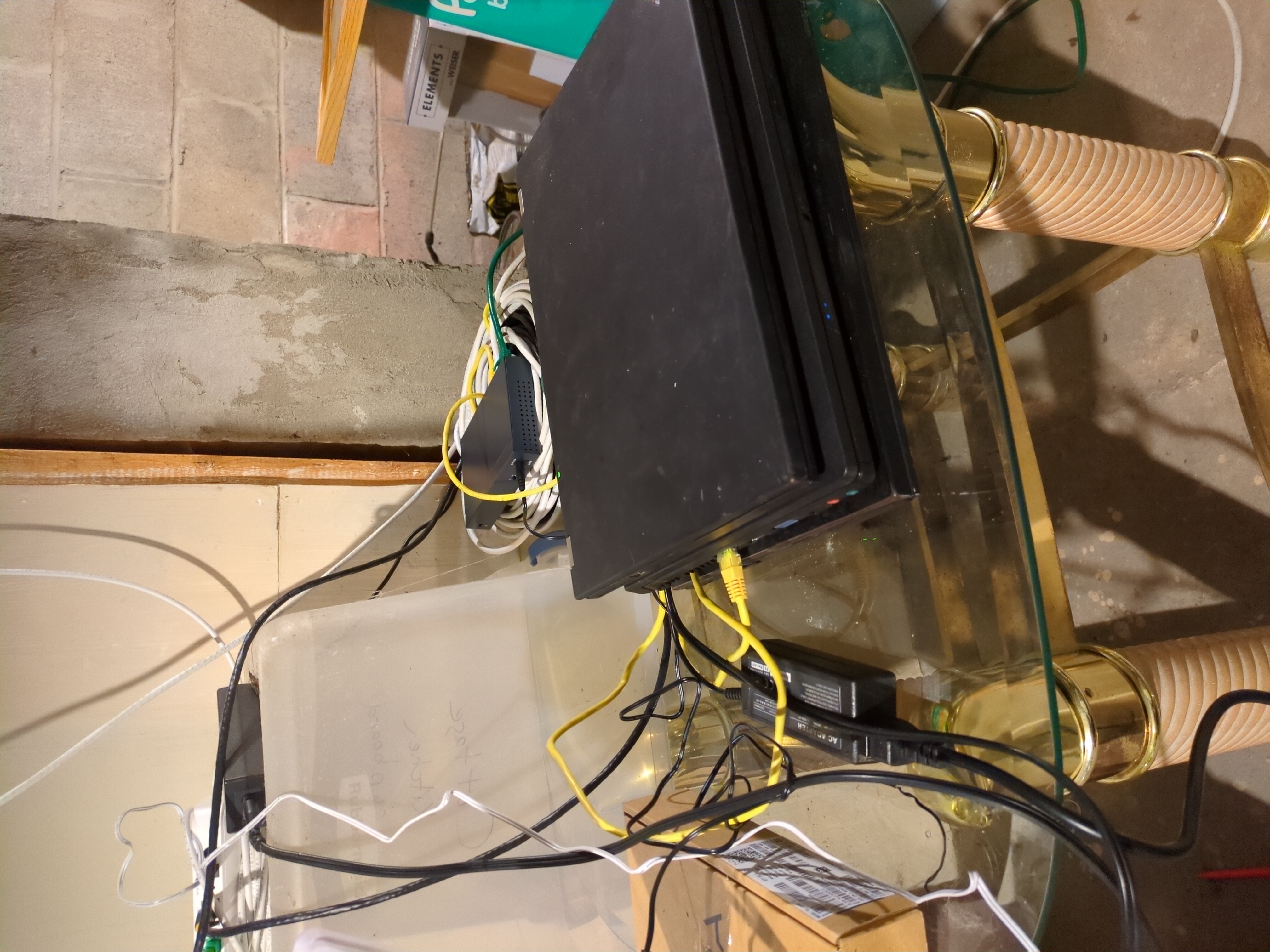about:compat in Firefox.
@movq@www.uninformativ.de Wow, I use Firefox and didn’t realize this existed! Thanks for pointing it out. I noticed at least one bug cited a webcompat.com report; I wonder if someone at Mozilla monitors those. https://webcompat.com/issues?page=1&per_page=50&state=open&stage=all&sort=created&direction=desc
@javivf@adn.org.es Welcome to twtxt!
@lyse@lyse.isobeef.org Thanks for taking a look, and for pointing out the mixture of tabs and spaces.
I think I’ll leave reachability.c alone, since my intention there was to use an indent level of one tab, and the spaces are just there to line up a few extra things. I fixed reachability_with_stack.cc though.
@prologic@twtxt.net Those aren’t actually serving anything public-facing. I’ve thought about it, but for now I’m sticking with VPSs, partly because I don’t relish the risk of weeks of downtime if something goes wrong while I’m travelling.
Okay, I won’t park there. 
@lyse@lyse.isobeef.org I don’t remember exactly. They might have been growing all winter. The trick is to have a badly insulated extension to the house.
@lyse@lyse.isobeef.org I am a big fan of “obvious” math facts that turn out to be wrong. If you want to understand how reusing space actually works, you are mostly stuck reading complexity theory papers right now. Ian wrote a good survey: https://iuuk.mff.cuni.cz/~iwmertz/papers/m23.reusing_space.pdf . It’s written for complexity theorists, but some of will make sense to programmers comfortable with math. Alternatively, I wrote an essay a few years ago explaining one technique, with (math-loving) programmers as the intended audience: https://www.falsifian.org/blog/2021/06/04/catalytic/ .
@lyse@lyse.isobeef.org Still melting! 
I’m in an article in Quanta Magazine! It’s about the bizarre world of algorithms that re-use memory that’s already full. https://www.quantamagazine.org/catalytic-computing-taps-the-full-power-of-a-full-hard-drive-20250218/ I’m the one with all the snow in the background.
@sorenpeter@darch.dk Sorry, I realized that shortly after posting. Here’s another attempt to post the images: 


Some satisfying icicle-breaking in our backyard: photos.falsifian.org/video/sM7G3vfS6yuc/VID_20250217_203250.mp4
I couldn’t resist taking home a prize:


It’s been snowy here in #Toronto.

(I tried formatting the images in markdown for the benefit of yarn and any other clients that understand it.)
robots.txt that I have on https://git.mills.io/robots.txt with content:
@prologic@twtxt.net Have you tried Google’s robots.txt report? https://support.google.com/webmasters/answer/6062598?hl=en . I would expect Google to be pretty good about this sort of thing. If you have the energy to dig into it and, for example, post on support.google.com, I’d be curious to hear what you find out.
@eapl.me@eapl.me I like this idea. Another option would be to show a limited number of posts, with an option to see the omitted ones by user. Either way, I wonder how well that works with threading.
I have a paper deadline coming up, so will everyone please stop writing twts for the next 48 hours, thanks.
@lyse@lyse.isobeef.org Thanks for sharing. I really enjoyed it. The beginning part about the history of life on Earth was fun to watch having just read Dawkin’s old book The Selfish Geene, and now I want to read more about archaea. The end of the talk about what might be going on on Mars made me a bit hopeful someone will find some good evidence.
@jost@jost.sdfeu.org Hello jost!
It turns out my ISP supports ipv6. After 4-5 months with only ipv4, I thought to ask customer support, and they told me how to turn it on. (I’m pretty happy with ebox so far. Low-priced fibre with no issues so far. Though all my traffic goes through Montreal, 500km away from me in Toronto, which adds a few ms to network latency.)
@andros@twtxt.andros.dev Sorry I missed your messages to #twtxt on IRC. There are people there, but it can take several hours to get a response. E.g. I check it every day or two. I recommend using an IRC bouncer. To answer your question about registries, I used a couple of registries when I first started out, to try to find feeds to follow, but haven’t since then. I don’t remember which ones, but they were easy to find with web searches.
@movq@www.uninformativ.de Looks fun. Also kind of looks like APL and Forth had a baby on Jupyter.
@andros@twtxt.andros.dev Hello!
@kh1b@kh1b.org Welcome to twtxt!
@wbknl@twtxt.net Welcome to the twtxt-iverse!
@lyse@lyse.isobeef.org Beautiful pictures, and beautiful HTML for a photo album!
@prologic@twtxt.net I’m grateful for this accident. I find browsing twtxt.net useful even though I don’t have an account there. I do it when I can’t use Jenny because I only have my phone, or if I want to see messages I might have missed. I know it’s not guaranteed to catch everything, but it’s pretty good, even if it’s not intentional.
@Codebuzz@www.codebuzz.nl I use Jenny to add to a local copy of my twtxt.txt file, and then manually push it to my web servers. I prefer timestamps to end with “Z” rather than “+00:00” so I modified Jenny to use that format. I mostly follow conversations using Jenny, but sometimes I check twtxt.net, which could catch twts I missed.
1/4 to mean "first out of four".
@bender@twtxt.net I try to avoid editing. I guess I would write 5/4, 6/4, etc, and hopefully my audience would be sympathetic to my failing.
Anyway, I don’t think my eccentric decision to number my twts in the style of other social media platforms is the only context where someone might write ¼ not meaning a quarter. E.g. January 4, to Americans.
I’m happy to keep overthinking this for as long as you are :-P
@bender@twtxt.net @prologic@twtxt.net I’m not exactly asking yarnd to change. If you are okay with the way it displayed my twts, then by all means, leave it as is. I hope you won’t mind if I continue to write things like 1/4 to mean “first out of four”.
What has text/markdown got to do with this? I don’t think Markdown says anything about replacing 1/4 with ¼, or other similar transformations. It’s not needed, because ¼ is already a unicode character that can simply be directly inserted into the text file.
What’s wrong with my original suggestion of doing the transformation before the text hits the twtxt.txt file? @prologic@twtxt.net, I think it would achieve what you are trying to achieve with this content-type thing: if someone writes 1/4 on a yarnd instance or any other client that wants to do this, it would get transformed, and other clients simply wouldn’t do the transformation. Every client that supports displaying unicode characters, including Jenny, would then display ¼ as ¼.
Alternatively, if you prefer yarnd to pretty-print all twts nicely, even ones from simpler clients, that’s fine too and you don’t need to change anything. My 1/4 -> ¼ thing is nothing more than a minor irritation which probably isn’t worth overthinking.
I installed GrapheneOS for the first time on Wednesday last week on a used Pixel 7a, and I’m impressed. Installation was almost seamless, and I was able to do it from another Android phone. I’ve run into very few wrinkles, even using Google’s proprietary apps with GrapheneOS’s “sandboxed” version of Google Play Services. The main problems I’ve noticed: I can’t cast, and Google Timeline doesn’t seem to work (though I imagine the intersection between people keen to use GrapheneOS and keen to have Google log their location history is pretty small).
@prologic@twtxt.net I’m not a yarnd user, so it doesn’t matter a whole lot to me, but FWIW I’m not especially keen on changing how I format my twts to work around yarnd’s quirks.
I wonder if this kind of postprocessing would fit better between composing (via yarnd’s UI) and publishing. So, if a yarnd user types ¼, it could get changed to ¼ in the twtxt.txt file for everyone to see, not just people reading through yarnd. But when I type ¼, meaning first out of four, as a non-yarnd user, the meaning wouldn’t get corrupted. I can always type ¼ directly if that’s what I really intend.
(This twt might be easier to understand if you read it without any transformations :-P)
Anyway, again, I’m not a yarnd user, so do what you will, just know you might not be seeing exactly what I meant.
@prologic@twtxt.net I wrote ¼ (one slash four) by which I meant “the first out of four”. twtxt.net is showing it as ¼, a single character that IMO doesn’t have that same meaning (it means 0.25). Similarly, ¾ got replaced with ¾ in another twt. It’s not a big deal. It just looks a little wrong, especially beside the 2/4 and 4/4 in my other two twts.
@prologic@twtxt.net One could argue twtxt.net’s display formatting is a little over-eager here.
Inversion by Aric McBay was another random library pick. Like The Fall of Io, it’s the most recent in a series, though I think this series is pretty loosely connected. In contrast, the villain in this book is simple and cartoonishly evil. The book presents a design for utopia which was interesting but a little cloying. I’m not sure if I’m supposed to want to live there, but I don’t think I do. I enjoyed the book as easy reading, and might try the others in the series some time. (4/4)
I read Starter Villain by John Scalzi. Enjoyable, like his other books that I’ve read. Somewhat sillier. (¾)
I’m enjoying Wesley Chu’s Tao and Io series. Spies, action, ancient aliens. Some funny parts, some interesting world-building parts, some action-filled parts. I picked up The Fall of Io at random from a library a few weeks ago, and it turned out to be the last in a series of six (technically two series), so after finishing that I read the first and am partway through the second. Usually I try to read series in order, but this way is interesting. One thing I liked about The Fall of Io was that it it followed many points of view with somewhat conflicting interests, some more evil than others, and I felt sympathy for most of them. (I was kind of hoping it would be about Jupiter’s moon Io, but it wasn’t, but I’m satisfied with what I ended up with.) (2/4)
@prologic@twtxt.net I think printf is a more portable option than echo -e for interpreting \t as tab. E.g. printf ‘%s\t%s\t%s’ “$url” “$time” “$text”. In general I always prefer printf over echo for anything non-trivial in unix shell scripts. See last paragraph of https://en.wikipedia.org/wiki/Echo_(command)#History
f:
@aelaraji@aelaraji.com You could just remove the {getuser()} part because you added ~.
Diving into mblaze, I think I’ve nearly* reached peek email geek.
Just a bunch of shell commands I can pipe together to search, list, view and reply to email (after syncing it to a local Maildir).
EXAMPLES at https://git.vuxu.org/mblaze/tree/README
So far I’m using most of the tools directly from the command line, but I might take inspiration from https://sr.ht/~rakoo/omail/ to make my workflow a bit more efficient.
*To get any closer, I think I’d have to hand-craft my own SMTP client or something.
@bender@twtxt.net It’s the experience of an ordinary person in a strange place where memories are disappearing with the help of the Memory Police. The setting feels contemporary (to the book’s 1994 publication date) rather than futuristic, except for some unexplained stuff about memories.
Yes, that is exactly what I meant. I like that collection and “twtxt v2” feels like a departure.
Maybe there’s an advantage to grouping it into one spec, but IMO that shouldn’t be done at the same time as introducing new untested ideas.
See https://yarn.social (especially this section: https://yarn.social/#self-host) – It really doesn’t get much simpler than this 🤣
Again, I like this existing simplicity. (I would even argue you don’t need the metadata.)
That page says “For the best experience your client should also support some of the Twtxt Extensions…” but it is clear you don’t need to. I would like it to stay that way, and publishing a big long spec and calling it “twtxt v2” feels like a departure from that. (I think the content of the document is valuable; I’m just carping about how it’s being presented.)
Recent #fiction #scifi #reading:
The Memory Police by Yōko Ogawa. Lovely writing. Very understated; reminded me of Kazuo Ishiguro. Sort of like Nineteen Eighty-Four but not. (I first heard it recommended in comparison to that work.)
Subcutanean by Aaron Reed; https://subcutanean.textories.com/ . Every copy of the book is different, which is a cool idea. I read two of them (one from the library, actually not different from the other printed copies, and one personalized e-book). I don’t read much horror so managed to be a little creeped out by it, which was fun.
The Wind from Nowhere, a 1962 novel by J. G. Ballard. A random pick from the sci-fi section; I think I picked it up because it made me imagine some weird 4-dimensional effect (“from nowhere” meaning not in a normal direction) but actually (spoiler) it was just about a lot of wind for no reason. The book was moderately entertaining but there was nothing special about it.
Currently reading Scale by Greg Egan and Inversion by Aric McBay.
More thoughts about changes to twtxt (as if we haven’t had enough thoughts):
- There are lots of great ideas here! Is there a benefit to putting them all into one document? Seems to me this could more easily be a bunch of separate efforts that can progress at their own pace:
1a. Better and longer hashes.
1b. New possibly-controversial ideas like edit: and delete: and location-based references as an alternative to hashes.
1c. Best practices, e.g. Content-Type: text/plain; charset=utf-8
1d. Stuff already described at dev.twtxt.net that doesn’t need any changes.
We won’t know what will and won’t work until we try them. So I’m inclined to think of this as a bunch of draft ideas. Maybe later when we’ve seen it play out it could make sense to define a group of recommended twtxt extensions and give them a name.
Another reason for 1 (above) is: I like the current situation where all you need to get started is these two short and simple documents:
https://twtxt.readthedocs.io/en/latest/user/twtxtfile.html
https://twtxt.readthedocs.io/en/latest/user/discoverability.html
and everything else is an extension for anyone interested. (Deprecating non-UTC times seems reasonable to me, though.) Having a big long “twtxt v2” document seems less inviting to people looking for something simple. (@prologic@twtxt.net you mentioned an anonymous comment “you’ve ruined twtxt” and while I don’t completely agree with that commenter’s sentiment, I would feel like twtxt had lost something if it moved away from having a super-simple core.)All that being said, these are just my opinions, and I’m not doing the work of writing software or drafting proposals. Maybe I will at some point, but until then, if you’re actually implementing things, you’re in charge of what you decide to make, and I’m grateful for the work.
@prologic@twtxt.net Done. Also, I went ahead and made two changes: changed hexadecimal to base64 for hashes (wasn’t sure if anyone objected), and changed “MUST follow the chain” to “SHOULD follow the chain.
@prologic@twtxt.net Thanks for pointing out it lasts four hours. That’s a big window! I wonder when most people will be on. I might aim for halfway through unless I hear otherwise. (12:00Z is a bit early for me.)
@movq@www.uninformativ.de Yes, the tools are surprisingly fast. Still, magrep takes about 20 seconds to search through my archive of 140K emails, so to speed things up I would probably combine it with an indexer like mu, mairix or notmuch.
#fzf is the new emacs: a tool with a simple purpose that has evolved to include an #email client. https://sr.ht/~rakoo/omail/
I’m being a little silly, of course. fzf doesn’t actually check your email, but it appears to be basically the whole user interface for that mail program, with #mblaze wrangling the emails.
I’ve been thinking about how I handle my email, and am tempted to make something similar. (When I originally saw this linked the author was presenting it as an example tweaked to their own needs, encouraging people to make their own.)
This approach could surely also be combined with #jenny, taking the place of (neo)mutt. For example mblaze’s mthread tool presents a threaded discussion with indentation.
@bender@twtxt.net Ha! Maybe I should get on the Markdown train. You’re taking away my excuses.
Sorry, you’re right, I should have used numbers!
I’m don’t understand what “preserve the original hash” could mean other than “make sure there’s still a twt in the feed with that hash”. Maybe the text could be clarified somehow.
I’m also not sure what you mean by markdown already being part of it. Of course people can already use Markdown, just like presumably nothing stopped people from using (twt subjects) before they were formally described. But it’s not universal; e.g. as a jenny user I just see the plain text.
@prologic@twtxt.net Do you feel the same about published vs. privately stored data?
For me there’s a distinction. I feel very strongly that I should be able to retain whatever private information I like. On the other hand, I do have some sympathy for requests not to publish or propagate (though I personally feel it’s still morally acceptable to ignore such requests).
